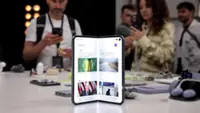A customer holds a Lightning to 3.5mm headphone jack adapter cable at the Apple Store in 2016. Apple is ditching its in-house iPhone charging plug and falling in line with the rest of the tech industry by adopting USB-C, a more widely used connection standard. — AP
LONDON: Bye, Lightning cable. Hello, USB-C.
Apple is ditching its in-house iPhone charging plug and falling in line with the rest of the tech industry by adopting a more widely used connection standard. A big part of the reason is a European Union common charging rule that's coming soon for the 27-nation bloc.





